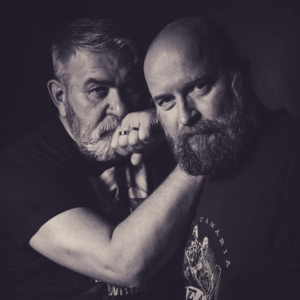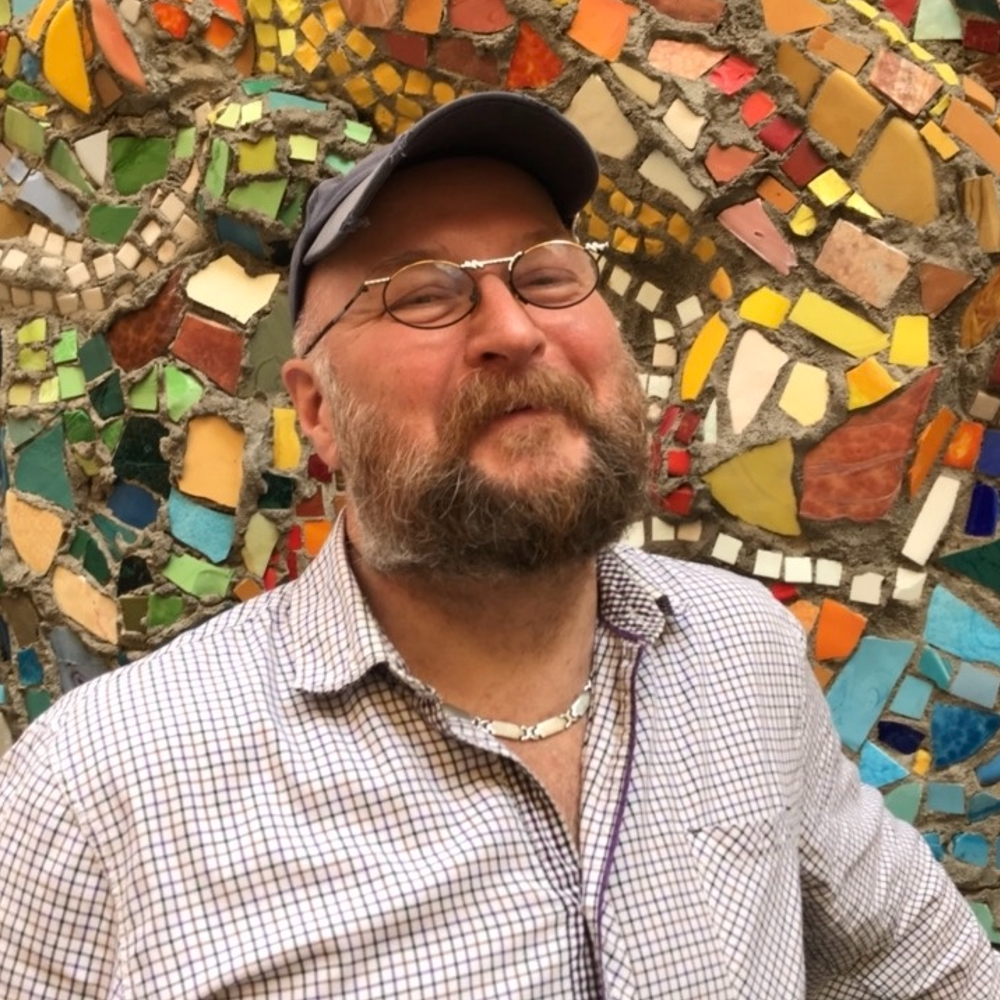Can you start by telling me what led to the first Tallinn Bearty Weekend?
To cut a long story short, it was a few long-pondered ideas, the right person to poke me, and another right person to be by my side realizing the ideas.
 Ever since I went to my very first bear pride (the weekenders where bear-folk gather) in Cologne, Germany, I wondered how freakin’ cool it would be to host bears one day in Tallinn. A shy 15 years passed, and along came Alex Gratch (bless you, my friend, wherever you roam now up high), co-founder of the St.Petersburg Bear Club, asking about doing a cross-border meeting of our two bear clubs. “Sure,” I said, “But why limit ourselves? Let’s make it a joint meeting of all the bear clubs around the Baltic Sea.” So it was said and done. Luckily for me, I met my dear husband Dima that same year, and he became the person happily sharing that joyous burden of organizing Tallinn Bearty ever since.
Ever since I went to my very first bear pride (the weekenders where bear-folk gather) in Cologne, Germany, I wondered how freakin’ cool it would be to host bears one day in Tallinn. A shy 15 years passed, and along came Alex Gratch (bless you, my friend, wherever you roam now up high), co-founder of the St.Petersburg Bear Club, asking about doing a cross-border meeting of our two bear clubs. “Sure,” I said, “But why limit ourselves? Let’s make it a joint meeting of all the bear clubs around the Baltic Sea.” So it was said and done. Luckily for me, I met my dear husband Dima that same year, and he became the person happily sharing that joyous burden of organizing Tallinn Bearty ever since.
Tallinn Bearty is described as a festival of the culture of gay and bisexual bears. How would you describe this culture, and can you tell me more about your efforts to represent it through Tallinn Bearty?
Bears are a part of the LGBT rainbow family’s sub-culture with its own flag, ideology, following, fans and partakers, events, and mission. By its origin, it is an inclusive, welcoming, and warm brotherhood of men. These men are mainly of a larger build and older, preferably hairy (but not required), and preferably bearded (but again, not required). In other words, men who do not fit the mainstream concept of a gay man: smooth, fit, sporty, and projecting an overall cliche idea of desirability. The whole beardom has evolved enormously since its first days half a century ago when largely outcast gay men started to come together in dedicated bars and clubs. One thing that continually defines a true bear is his heart — he’s warm, welcoming, and kind, offering hugs to anyone in need.
Bear culture is a loose term that binds together social life, visual arts, music, cinema, and other artforms done by and depicting bear community and bears. Tallinn Bearty is built around a tri-annual rotation of visual arts, music, and cinematography, so we focus on one every consecutive year. So, for example, visual arts will be back for the third time around in 2022, with a roster of program artists showcasing different works.
How do you decide what sort of art is showcased at Tallinn Bearty?
We try not to interfere with the artistic intent of our program artists, giving them the freedom to decide about what and how to showcase. But, of course, it is a negotiation process because it has to match our capacity to host and the physical requirements of the venues we scout.
What has been the reaction to Tallinn Bearty, both within the LGBTI community and in Estonia in general?
It has been pretty amazing, to our surprise. We are not a huge festival, but as a niche, we represent a wide selection of art by amateur and professional artists and try to do that across the whole spectrum of creativity. All in all, within the bear community itself, we are probably one of only two in the world that consciously focus and represent the arts and its creators, the other one being the legendary Provincetown’s Bear Week — cheers to the Ptown boys!
Similarly, we seem to have attracted interest in the broader scope of the rainbow family, first locally because we support and closely cooperate whenever we can with the Estonian LGBT Association. Secondly, we are connecting across borders because word spreads and publications like yours spread the word. So we are pleased about that.
Estonia, in general, is still learning about the bear community, which is great because it is a mission of ours — to familiarize society and make them comfortable, with a greater understanding of the LGBT family. There is no need for hate because we are all human beings, and nobody is trying to make anybody gay. We feel bears’ stereotypical image of ruggedness and cuddly looks can help achieve that goal nicely. Reality shows we have a growing fanbase, if I may say, or at minimum, people are aware of bears as a community much more than before, even within the local LGBT community. Yay to that!
Can you tell me more about the influence Tallinn Bearty has had in the Baltic region as a whole?
Firstly, we are trying to unite the bears of Estonia, Latvia, and Lithuania and make them feel comfortable. Although Estonia is the only one of the three to have a social group or club of bears, the other two also have a community present. This community exists mainly as a network of friends, but many people have not yet dared to join.
As a festival with a mission, Tallinn Bearty is known to LGBT organizations in all three countries. The same goes for the involved embassies in Tallinn. The most recent example of extending our network was IDAHOT 2021, when we joined forces with the Irish Embassy in Tallinn to promote the online screening of a powerful documentary, The Queen of Ireland.
And, happily, due to our good online presence, we seem to pop up in searches when people elsewhere in the world are looking for entry points to anything LGBT-related in Estonia. Most recently, we helped out the Radical Faeries when they needed local context and guidance.
We have also seen that Tallinn Bearty has had an influence further to the west of the Baltic Sea. For example, in mostly the Norwegian — but also Polish, German, Russian, and Ukrainian — bear communities, we see how becoming familiar with and experiencing “the Tallinn Bearty factor” has resulted in a rise in activism. For example, John Earhart, the head of the Norwegian Bear Club, has repeatedly said that becoming part of the Tallinn Beary family has drastically increased the activities and activism of the club, both within the country and in their international relations. Notably, they have directly influenced their embassy in Kyiv to support the LGBTI cause in Ukraine. In addition, a Stockholm based Nordic LGBTI Cultural Workers organisation has launched a series of Bear International Awards: The “Hyacinthus” for Bear art and culture; the “Iolaus” for special battles of courage; and the “Calais” for international networking and travelling.
What is the attendance like at Tallinn Bearty?
Out of 200 participants — give or take, depending on the year — at least 80% are bears who travel to Tallinn for Bearty weekend. The rest are locals and not just LGBT people. It is incredible to see how in our public, free exhibitions, for example, we have seen whole families with kids. Our public discussions are popular even among the academic and student crowd, and old and new friends visit our movie screenings and concerts. Although our platform is not the biggest, we are working to broaden it and reach a wider society. For example, we are networking with both on- and offline contacts and creating promotions within our capacity. We help fellow promoters, offer pro bono assistance, and participate in conversations as guests on things like IDA Radio shows, the podcasts Positiivne Mürk and Lilla Agenda, and the ETV+ panel discussion on same-sex marriage and equal rights.
How would you describe the situation for LGBTI people in Estonia today?
It is better than any time in the country’s history, yet far from satisfying. According to a recent poll by the Estonian Human Rights Center, the public is becoming more and more accepting of same-sex relationships and LGBT people, despite (or maybe thanks to) a wave of far-right conservatism. In real life, however, LGBT people still have to endure constant bullying and discrimination, silently in the vast majority of cases. Although there is maybe not so much physical violence— though there are sad cases now and then — psychological trauma in their everyday lives is still very much a problem. For example, not feeling comfortable enough to reveal your own identity in fear of judgment, rejection, stigmatization — ultimately the fear of losing one’s sense of security — is enough reason to keep marching forward for equality. Preach love!
Have you seen any changes since you started hosting Tallinn Bearty?
Estonia did adopt a Gender-Neutral Civil Partnership law, although the provisions to the law are still not ratified. However, we know and feel that cooperation with international organizations has grown bigger and stronger year after year, and the embassies in Tallinn are increasingly interested in advancing LGBT equality.
Have you had any difficulties organizing Tallinn Bearty?
It still surprises us that we have only been met with welcoming attitudes and support on a broader scale — single instances discounted. Only two cases have been based on a mild form of corporate homophobia _ à la, “We don’t want to be associated with YOUR kind of cause”— and only one case of personal hate speech via a verbal attack. I’d say these are pretty low numbers, and we are happy to bring the change forward.
How has the Covid-19 pandemic affected Tallinn Bearty?
When it all started, we had to postpone and then cancel the events of 2020. In 2021, after collecting ourselves, we could only bring an online selection of offerings. In 2022, we will aim to get in-person events back for those who feel comfortable traveling and attending. But no one can predict with certainty what the situation will be.
Can you tell me about your plans for 2022?
The dates for the next Tallinn Bearty are 21-24 April 2022. We are back with our regular programming, trying to project some sense of security by not changing much of our worked-out format.
The theme will be visual arts, which means we will bring several artists and their works to Tallinn Bearty, including pop-up exhibitions, both indoors and out, all for free viewing. The next Tallin Bearty will be bolstered with talks and conversations to provide food for thought and raise awareness of equality. There will be evening parties where you can meet old friends and make new ones for your heart. The aim is to create a sense of beautiful togetherness, free of fear and judgment for who you are. Based on feedback from previous years, we seem to achieve that pretty darn well!
Do you organize any other programs or events throughout the rest of the year?
We keep ourselves busy during the rest of the year, too. Our mission is to advance equal rights by working with organizations of like-minded people, and that work does not put itself on hold when we aren’t running our main event. So, yeah, whether it is moderating conversations, giving interviews, welcoming the traveling LGBT community, helping with information and leads, or even putting on some parties — we keep ourselves involved. In most cases, you will see what we have done or will do either on our news page or on Facebook @tallinnbearty. You can also follow us on Instagram @tallinn.bearty — hop on board, and let’s take a ride to a better future!

